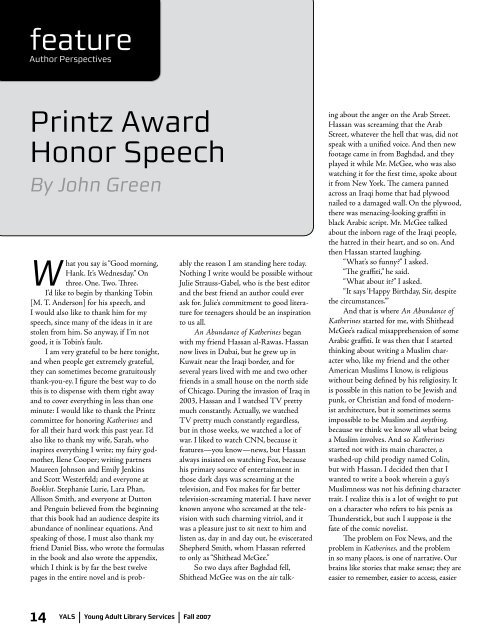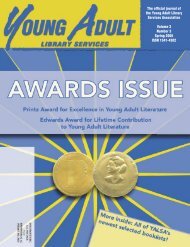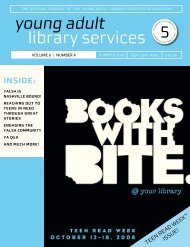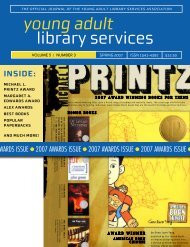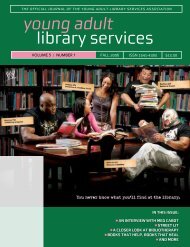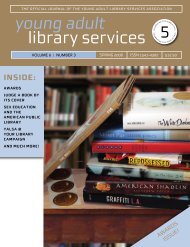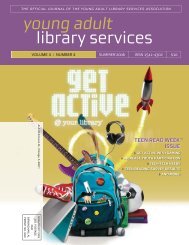Fall 2007 - YALSA - American Library Association
Fall 2007 - YALSA - American Library Association
Fall 2007 - YALSA - American Library Association
Create successful ePaper yourself
Turn your PDF publications into a flip-book with our unique Google optimized e-Paper software.
feature<br />
Author Perspectives<br />
Printz Award<br />
Honor Speech<br />
By John Green<br />
What you say is “Good morning,<br />
Hank. It’s Wednesday.” On<br />
three. One. Two. Three.<br />
I’d like to begin by thanking Tobin<br />
[M. T. Anderson] for his speech, and<br />
I would also like to thank him for my<br />
speech, since many of the ideas in it are<br />
stolen from him. So anyway, if I’m not<br />
good, it is Tobin’s fault.<br />
I am very grateful to be here tonight,<br />
and when people get extremely grateful,<br />
they can sometimes become gratuitously<br />
thank-you-ey. I figure the best way to do<br />
this is to dispense with them right away<br />
and to cover everything in less than one<br />
minute: I would like to thank the Printz<br />
committee for honoring Katherines and<br />
for all their hard work this past year. I’d<br />
also like to thank my wife, Sarah, who<br />
inspires everything I write; my fairy godmother,<br />
Ilene Cooper; writing partners<br />
Maureen Johnson and Emily Jenkins<br />
and Scott Westerfeld; and everyone at<br />
Booklist. Stephanie Lurie, Lara Phan,<br />
Allison Smith, and everyone at Dutton<br />
and Penguin believed from the beginning<br />
that this book had an audience despite its<br />
abundance of nonlinear equations. And<br />
speaking of those, I must also thank my<br />
friend Daniel Biss, who wrote the formulas<br />
in the book and also wrote the appendix,<br />
which I think is by far the best twelve<br />
pages in the entire novel and is probably<br />
the reason I am standing here today.<br />
Nothing I write would be possible without<br />
Julie Strauss-Gabel, who is the best editor<br />
and the best friend an author could ever<br />
ask for. Julie’s commitment to good literature<br />
for teenagers should be an inspiration<br />
to us all.<br />
An Abundance of Katherines began<br />
with my friend Hassan al-Rawas. Hassan<br />
now lives in Dubai, but he grew up in<br />
Kuwait near the Iraqi border, and for<br />
several years lived with me and two other<br />
friends in a small house on the north side<br />
of Chicago. During the invasion of Iraq in<br />
2003, Hassan and I watched TV pretty<br />
much constantly. Actually, we watched<br />
TV pretty much constantly regardless,<br />
but in those weeks, we watched a lot of<br />
war. I liked to watch CNN, because it<br />
features—you know—news, but Hassan<br />
always insisted on watching Fox, because<br />
his primary source of entertainment in<br />
those dark days was screaming at the<br />
television, and Fox makes for far better<br />
television-screaming material. I have never<br />
known anyone who screamed at the television<br />
with such charming vitriol, and it<br />
was a pleasure just to sit next to him and<br />
listen as, day in and day out, he eviscerated<br />
Shepherd Smith, whom Hassan referred<br />
to only as “Shithead McGee.”<br />
So two days after Baghdad fell,<br />
Shithead McGee was on the air talking<br />
about the anger on the Arab Street.<br />
Hassan was screaming that the Arab<br />
Street, whatever the hell that was, did not<br />
speak with a unified voice. And then new<br />
footage came in from Baghdad, and they<br />
played it while Mr. McGee, who was also<br />
watching it for the first time, spoke about<br />
it from New York. The camera panned<br />
across an Iraqi home that had plywood<br />
nailed to a damaged wall. On the plywood,<br />
there was menacing-looking graffiti in<br />
black Arabic script. Mr. McGee talked<br />
about the inborn rage of the Iraqi people,<br />
the hatred in their heart, and so on. And<br />
then Hassan started laughing.<br />
“What’s so funny?” I asked.<br />
“The graffiti,” he said.<br />
“What about it?” I asked.<br />
“It says ‘Happy Birthday, Sir, despite<br />
the circumstances.’”<br />
And that is where An Abundance of<br />
Katherines started for me, with Shithead<br />
McGee’s radical misapprehension of some<br />
Arabic graffiti. It was then that I started<br />
thinking about writing a Muslim character<br />
who, like my friend and the other<br />
<strong>American</strong> Muslims I know, is religious<br />
without being defined by his religiosity. It<br />
is possible in this nation to be Jewish and<br />
punk, or Christian and fond of modernist<br />
architecture, but it sometimes seems<br />
impossible to be Muslim and anything,<br />
because we think we know all what being<br />
a Muslim involves. And so Katherines<br />
started not with its main character, a<br />
washed-up child prodigy named Colin,<br />
but with Hassan. I decided then that I<br />
wanted to write a book wherein a guy’s<br />
Muslimness was not his defining character<br />
trait. I realize this is a lot of weight to put<br />
on a character who refers to his penis as<br />
Thunderstick, but such I suppose is the<br />
fate of the comic novelist.<br />
The problem on Fox News, and the<br />
problem in Katherines, and the problem<br />
in so many places, is one of narrative. Our<br />
brains like stories that make sense; they are<br />
easier to remember, easier to access, easier<br />
14 YALS | Young Adult <strong>Library</strong> Services | <strong>Fall</strong> <strong>2007</strong>


